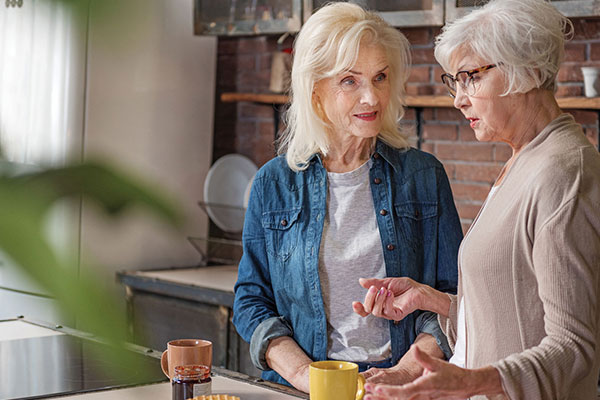I’m Done with Cancer Treatment. Why Am I So Upset All the Time?
A Closer Look at What Causes Post-Treatment Distress & What You Can Do About It
by Jill Mitchell, PhD, LCSW, OSW-C
Everyone is celebrating the end of my treatments, but I just feel like crying.
I powered through treatment and thought I was doing just fine, but I seem to have fallen off a cliff after finishing chemo.
My friends and family expect me to be back to “normal,” but I feel like I’m falling apart.
What if I can’t keep up when I return to work?
Who am I now?
I miss seeing my doctor, the nurses, and the other patients at the clinic. I feel so alone now.
I feel guilty because I know I SHOULD be eating better, exercising, sleeping more, and stressing less, but I can’t seem to do it all.
I’m done with treatment, but I can’t stop worrying about whether this could recur.
Does any of this sound familiar? If you recognize yourself in these statements, please know that you are not alone.
Many survivors experience post-treatment distress.
Although most survivors do well post-treatment after an initial adjustment period, research shows that, on average, one-third to one-half of cancer survivors who are finished with treatment express at least a moderate level of anxiety (fear of recurrence being a large part of that). And a smaller percentage of survivors indicate a moderate level of depression once treatment ends.
There are many reasons why cancer survivors might feel distress and anxiety as they transition back into life after finishing cancer treatment.
- Primary treatment (surgery, chemotherapy, radiation) may have a clear end-point, but the fear of recurrence and the shadow of having experienced a cancer diagnosis may stick around indefinitely.
- Even though you may be done with intensive treatments, the side effects may linger longer than you had envisioned.
- It’s scary to go from regular office visits, where you had ample opportunities to ask about the smallest of symptoms, to coming in to see your doctor only once every several months and having to judge for yourself what small physical changes are normal or abnormal.
- The support from your coworkers, family, loved ones, and friends who were patient and understanding during your treatment may have disappeared as people are eager for you to “get back to normal” once treatment is done.
- Perhaps you were so focused on just surviving and getting through treatment that you didn’t have the time or the physical energy to allow yourself to really process what you were going through emotionally until you finished surgery, chemo-therapy, or radiation.
What can help?
If any of the above statements resonates with you, there are things you can do to move forward from this distress. First of all, understand that if you are feeling some post-treatment distress, this is typical. You are not alone, and you do not need to go through this alone. Talking with a therapist who has experience treating people who’ve gone through cancer, serious illness, or trauma can be very beneficial in helping you assess what is “normal” and figure out what additional support you might need.
Allow yourself to acknowledge what you have been through and to grieve the losses you may be continuing to experience.
Consult with your oncologist’s office about what they offer in terms of survivorship visits and survivorship resources. More and more, oncology clinics are realizing the post-treatment needs of cancer survivors and are offering specialized clinician visits, educational programs, counseling, support groups, rehabilitation classes, and connection to community programs specifically designed to meet those needs.
Don’t expect your closest friends and family to always understand. Be sure to also talk with other post-treatment survivors. It can be quite enlightening to share your honest experiences (both the growth and the challenges) with people who share common ground.
Allow yourself to acknowledge what you have been through and to grieve the losses you may be continuing to experience. Perhaps you didn’t have the emotional energy, focus, or perspective to do this while you were engrossed in cancer treatment. However, struggling with keeping these feelings of loss at bay can take a lot more energy and focus over the long run than acknowledging them and moving toward acceptance of these losses.
In addition to grieving your losses, practice noticing and acknowledging what you feel authentically grateful for in the present moment. Jot down three simple things you feel grateful for each day (for example, a smile from a stranger, witnessing a beautiful sunrise, or the taste of fresh apple pie). Some days, if you’re feeling very low or anxious, this may be particularly hard. However, this is not about “faking” happiness, but rather about tuning your perception toward authentic gratitude. Like exercising a muscle, intentionally practicing gratitude can help strengthen your ability to feel more grateful, and to feel more peace, hope, and inspiration, even amid grief and uncertainty.
The support from your coworkers, family, loved ones, and friends who were patient and understanding during your treatment may have disappeared as people are eager for you to “get back to normal” once treatment is done.
Reflect upon how you have tended to cope with challenges in the past. Has getting out and socializing, exercising, meditating, engaging with spiritual practices, or talking with a professional helped you in the past? Are you doing that now? If not, what small steps can you take today to do more of that?
You may feel like a different person after treatment, or perhaps you feel lost in a sea of uncertainty. Take this as an opportunity to reflect upon and clarify what you value most in life. To help with this you might want to explore and take note of your answers to the following questions:
- What were you doing the last time you felt joyful and vital?
- When do you feel most at peace or most whole?
- What gives you a deep sense of purpose in your life?
- When do you feel most like the person you wish to be?
After taking time to clarify your values, think about and write down some ways you might put those values into action. Start by thinking about small things you can do today, and then move toward also thinking about how you might engage your values in larger ways in the coming weeks, months, and years. For example, if you value creativity, perhaps you might commit to spending ten minutes drawing or painting today, and then commit to the larger goal of taking an art class before the end of the year.
Get out of your head and get moving. Exercise (as permitted by your physician) is one of the best things you can do to help manage your mood and emotions. It may feel a little counter-intuitive, but exercise is also one of the best things you can do to help with post-treatment fatigue.
Finally, practice welcoming patience and compassion for yourself as you continue through this process of adjusting to life after cancer and living with greater uncertainty. Have you ever noticed how unkind and judgmental we can be of ourselves? If that is the case for you, then it might help to invite self-compassion by first imagining what expressions of kindness you might offer to a friend or loved one in your situation. And then, imagine directing those same kind words back to yourself.

Dr. Jill Mitchell is an oncology social worker and coordinator of psychosocial research for Rocky Mountain Cancer Centers in Boulder, CO. In addition to doing individual counseling with people living with cancer, Dr. Mitchell has facilitated hundreds of group programs and is presently engaged in research on multiple support group interventions with the aim of decreasing depression and anxiety and increasing happiness and “valued living” for cancer patients, survivors, and caregivers.
This article was published in Coping® with Cancer magazine, September/October 2018.


